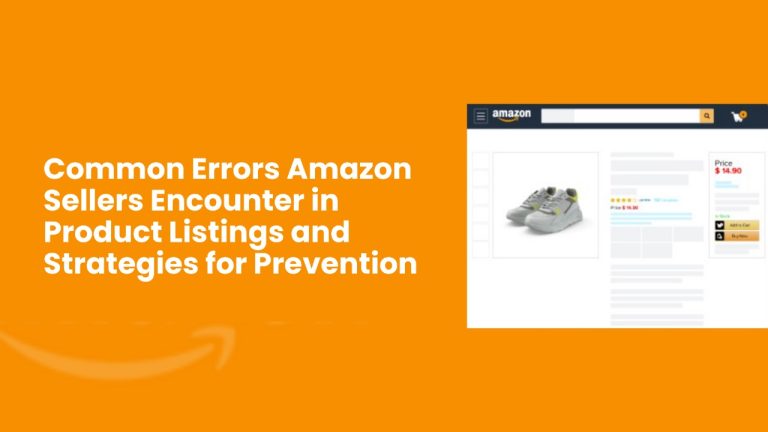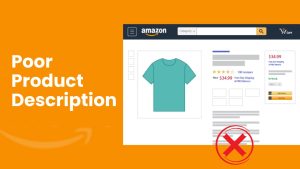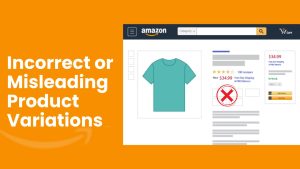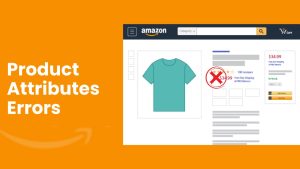Introduction
Are you tired of the sudden drops in sales, listing suspensions, or unfair Amazon policies? Well, you are not alone. Amazon Marketplace is an incredibly complex platform. A simple misstep can cause devastating losses. In the worst cases, your account can even get banned. Amazon’s listing rules and SEO algorithms don’t play nice with half-measures or guesswork. Avoid the common mistakes that can flag your listings. Moreover, there are several strategies to prevent these mistakes. We will break down the most common errors Amazon sellers face and show you how to bulletproof your listings for long-term success.
Amazon is one of the most competitive platforms in the e-commerce industry. Every detail matters on Amazon, and any mistake in your product listing can destroy your Amazon business. Creating an Amazon listing seems straightforward. However, it is easy to overlook important fields such as generic keywords. It decreases your visibility and causes a decline in sales. You have to look out for all the keywords. Policy violations are the easiest way to get your listing banned. Sellers commonly face problems that impact their rankings, limit their reach, or result in costly listing suspensions. It is essential to understand and avoid these errors to maximize profitability.
Read More: How to Maximize Sales with Amazon Deals
Mistakes on Amazon cause severe penalties and lost opportunities. Missteps like keyword stuffing, non-compliant images, or unsupported claims can trigger Amazon’s algorithms, resulting in your listing being flagged or removed. Repeated offenses will decrease your Amazon account’s health and credibility. It is essential to recognize these errors and adopt preventive strategies, helping to protect your listings and ensuring sustained growth.
SEO Errors
Keywords dictate your product visibility on Amazon. However, overusing or stuffing keywords in the product listing hurts your product ranking. Therefore, you must use the appropriate keywords in the title, bullets, and backend fields. Amazon’s A9 algorithm penalizes keyword stuffing. Instead of boosting your visibility, keyword stuffing can lower your search ranking and make your listing appear spammy to potential customers. It is essential to balance high-value keywords and compelling copywriting rather than cramming them into the product listing.
Restricted keywords are another pitfall that seriously lowers your product ranking and can cause listing suspension. Many sellers unknowingly include terms that Amazon flags as prohibited, such as “cure,” “safe,” or “100% natural,” particularly in categories like health and beauty. Using these words can lead to your listing being suppressed or removed, potentially resulting in lost sales and added headaches. Please check out Amazon’s keyword guidelines or online restricted keywords checklist to avoid these problems. Avoid keyword errors and restricted words to improve your Amazon product listing ranking.
Read More: Cracking the Code: Amazon SEO and Keywords in 2024
Inaccurate Product Titles
The product title is the first thing Amazon buyers see. An accurate title is crucial for better search rankings, CTR, and conversion rates. Yet, many Amazon sellers make the mistake of creating titles that are either too long and cluttered or too short and uninformative. Overloading a title with excessive details or unnecessary keywords can confuse customers and make the product appear unprofessional. Moreover, titles must communicate essential features to satisfy the buyers. Buyers will never click on your listing in the search results if titles have unnecessary information. Amazon recommends including relevant details like brand, product type, and key features, all within the platform’s character limits, to ensure your title is clear, concise, and search-friendly.
Misleading or exaggerated information in the product title is another issue. Adding unsupported claims or including phrases like “best” or “number one” can set unrealistic expectations and lead to negative customer experiences. Amazon has strict guidelines around brand names in titles; if your title includes brand names that aren’t directly related to the product, it can result in your listing being flagged or suppressed. Accurate and authentic titles build trust with shoppers, helping you create brand loyalty. You must craft precise titles with accurate and reliable information.
Read More: Keyword Ranking On Amazon FBA Using Product Testing Campaigns
Poor Product Description
Product description should include essential product specifications to clear up customer doubts. It is an opportunity to convince your customer that your product is the perfect solution to their problem. You can replace the product description with Enhanced Brand Content (EBC). It includes many visuals, allowing you to charm the buyers with stunning product images and infographics. Buyers want to know the benefits, unique features, and materials used in the product before making a purchase decision. Therefore, your product description should answer all their queries. Paint a vivid picture of what the customer can expect. Check if your bullet points and text are highly readable and appealing.
Let’s talk about EBC now. It is the perfect replacement for the product description. EBC is a powerful method of charming audiences with stunning visual elements. Replacing your basic product description with EBC enables you to create a more compelling and informative layout, guiding customers through the unique aspects of your product with eye-catching visuals and organized sections. You can use EBC to break down complex features, show the product in use, and direct comparisons to other products in your line, which can be particularly useful for cross-selling.
Poor Image Quality
Good images are necessary for any successful Amazon product listing. Several sellers upload stock pictures or poorly edited images, believing visuals are unimportant for sales. These low-resolution images fail to mesmerize customers. Amazon requires at least one high-resolution image with a pure white background. However, all pictures should be extremely high-quality, showing different angles and close-up shots. Therefore, you need a professional Amazon product photography service. Quality images will transform your listing, allowing you to boost customer confidence and increase the conversion rate.
Non-compliant images and inappropriate icons or infographics severely lower the conversion rate. You are wasting money on Amazon PPC if you don’t have good Amazon listing images. You must have lifestyle images demonstrating the product’s use in real-life scenarios, helping customers envision how it fits into their lives. Nowadays, you need professional models with an experienced photography crew to elevate your product images. Decent lighting, different product angles, and stunning backgrounds will help you increase your conversion rate. Hence, the listing images must make a positive first impression on potential buyers.
Read More: How to Name Your Product Images and Amazon Attribution for Effective SEO
Incorrect or Misleading Product Variations
Amazon listing creation can be a nightmare for new Amazon sellers. Incorrectly setting up product variation relationships causes severe problems. A common mistake is incorrectly setting up variation relationships, which can cause different options to display as separate listings rather than being grouped under one main product. It results in incorrect product fulfillment, frustrating potential buyers who search for the correct variation while leading to fragmented reviews and lower overall visibility. Ensure that all variations are connected in the backend. Check out all the details when you add product variations.
Incorrect dimensions, weight, or pack options can mislead customers and lead to order cancellations. For example, failing to list the correct dimensions for different size variations can result in returns, as buyers may receive products that don’t match their expectations. Errors in pack options, such as mislabeling a single item as a multi-pack, can lead to unhappy customers and negative feedback. It is also common for sellers to overlook specific fields in the backend, like bullet points for each variation, which help customers quickly compare different options. Paying close attention to these details and thoroughly double-checking each entry ensures your listing is complete and accurate.
Read More: AI-Powered Amazon Product Photography: The Future For Amazon Sellers
Product Attributes Errors
Pricing your products correctly on Amazon is a delicate balancing act. Small mistakes can have significant consequences. Sellers often set the prices too high or too low without fully considering the competitive landscape. The poor pricing strategy affects sales and profit margins, causing the business to suffer severe losses. Overpricing deters customers and pushes them toward competitors. Underpricing creates a perception that your product is low-quality. Moreover, Amazon’s automated pricing tools also lead to unintended price drops and hikes. These pitfalls significantly lower the business’s profitability.
Promotional offers, coupons, and deals also prove problematic for sellers. Some sellers fail to accurately set up discounts or forget to monitor the expiration dates of promotions, leading to lost revenue or expired deals that frustrate customers. Inaccurate pricing can also affect your eligibility for the Buy Box. Maintain consistency and check your pricing entries, regularly viewing base prices and promotional deals. Take time to manage your pricing and keep your listing competitive in the marketplace.
Inventory Management Errors
Amazon inventory management is the biggest challenge for new Amazon FBA sellers. Failing to manage the inventory leads to missed sales opportunities and customer dissatisfaction. Neglecting stock levels can lead to your product listing being unavailable. It results in negative feedback and canceled orders, damaging your seller rating and impacting future sales. Staying on top of inventory and using Amazon’s inventory management tools or third-party software can help you maintain adequate stock levels and avoid running out during peak demand. Forecast demand and keep an eye on sales trends to manage inventory.
Mislabeling and mismanaging fulfillment types, such as accidentally listing a product as Fulfilled by Amazon (FBA) when you plan to ship it seriously affect inventory management. These inconsistencies can lead to shipping delays and confusion, especially if customers expect a faster delivery timeline associated with FBA. Some Amazon FBA sellers overlook the importance of setting reorder points, which can cause delays in replenishing stock, particularly for high-demand products. Taking the time to set accurate inventory levels and align fulfillment methods with customer expectations is essential for smooth operations.
Amazon Reviews Management
Customer reviews are crucial for building trust and driving sales on Amazon, but managing them is challenging for many sellers. A common mistake is neglecting to monitor and respond to negative and positive reviews. When customers leave feedback—whether positive or constructive—they are providing valuable insights into your product and service. Ignoring negative reviews can harm your reputation, as future customers may interpret a lack of response as indifference or poor customer service. Please address all customer reviews and contact them as soon as possible. Demonstrate your commitment to customer satisfaction and increase the likelihood of turning a dissatisfied customer into a repeat buyer.
Some sellers use questionable tactics of buying and manipulating reviews. They incentivize positive feedback or attempt to suppress negative comments. Amazon’s policies are strict about review manipulation, and engaging in these practices can result in severe penalties, including listing suspension. Instead, focus on organic methods to gather genuine reviews. You can use Amazon’s “Request a Review” button to encourage customers to share their experiences or even include a follow-up message that politely asks for feedback.
Read More: How To Get Reviews From Friends And Family On Amazon
How An Amazon Agency Will Help You Minimize These Errors
Preventing errors in Amazon product listings requires a proactive approach that combines careful planning, regular monitoring, and, when possible, expert assistance. Consider hiring a full-service Amazon agency to avoid some of these errors. These agencies specialize in everything from product listing optimization to keyword research, inventory management, and compliance monitoring. An agency can also help you stay on top of Amazon’s policy changes and updates, reducing the risk of unexpected listing suspensions or account issues. Furthermore, a team of full-service Amazon agency experts will optimize your product listings for maximum conversions.
Conducting periodic audits of your listings can catch errors early. Whether ensuring that your images meet Amazon’s quality standards or that your keywords are relevant and effective, regularly reviewing your listings helps you maintain a polished, professional presence on the platform. Agencies can assist with this process by implementing data-driven strategies and using advanced tools to analyze your performance, identify areas for improvement, and make necessary adjustments.
A proactive approach—such as setting up alerts or scheduling periodic audits of your listings—allows you to remain compliant and adapt to Amazon’s evolving marketplace requirements. Demonstrate your commitment to Amazon’s standards and create a more resilient business.
Read More: Boost Your Amazon Ranking with 5 Insane Seller Hacks
Conclusion
Mastering Amazon requires keen attention to detail and a commitment to excellence in every aspect of your product listings. There is a lot that goes into creating a listing that attracts customers and drives sales. Avoiding common errors is necessary for building a successful Amazon business. Working with an Amazon agency or consulting with experts can provide valuable insights, streamline your processes, and help ensure that your listings are compliant, optimized, and highly visible.








